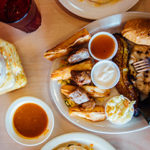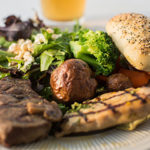 In the June issue of Convene, executive editor Chris Durso profiles the inaugural ATD Values Vets conference, a meeting organized by the Association for Talent Development and one that explores the challenges and successes around helping veterans find post-service jobs.
In the June issue of Convene, executive editor Chris Durso profiles the inaugural ATD Values Vets conference, a meeting organized by the Association for Talent Development and one that explores the challenges and successes around helping veterans find post-service jobs.
One place where vets can make a relatively smooth transition from military life to civilian work life is inside commercial kitchens. Why do vets make such good prep cooks and chefs? Because they often fit seamlessly into restaurant kitchens, where a type-A chef might bark orders (‘Yes, chef!’) and maintain a strict line of command. Or because they possess the focus to perform repetitive prep tasks (such as julienning carrots) with precision, night after night. Or that vets just seem well-suited for the pace and stressors of food service and the intensity of the line. (“Seeing somebody that you know very well die puts everything in the kitchen into such perspective,” said New Orleans chef Johh Besh, a former Marine, in 2013.)
In fact, the Culinary Institute of America was founded in 1946 primarily to train returning WWII vets in the culinary arts. The 50 students who originally enrolled in what was then the New Haven Restaurant Institute attended on the GI Bill. By 1950, the school had graduated 600 veterans. Seventy years later, this prestigious culinary school still has a dedicated veterans admissions officer on staff (who offers Skype information sessions) and 150 veterans are enrolled. The Post-911 GI Bill offers significant reimbursement for tuition and housing, even for a vet who might want to attain a bachelor’s degree in pastry and baking arts.
So besides keeping us safe, veterans have also deeply shaped American cuisine. Hopefully, they’ll continue to find their way into kitchens — whether in restaurants, schools, or convention centers — via CIA or in a myriad of other training programs, such as Culinary Command, Colorado’s Vets to Chefs, or L’Academie de Cuisine.




